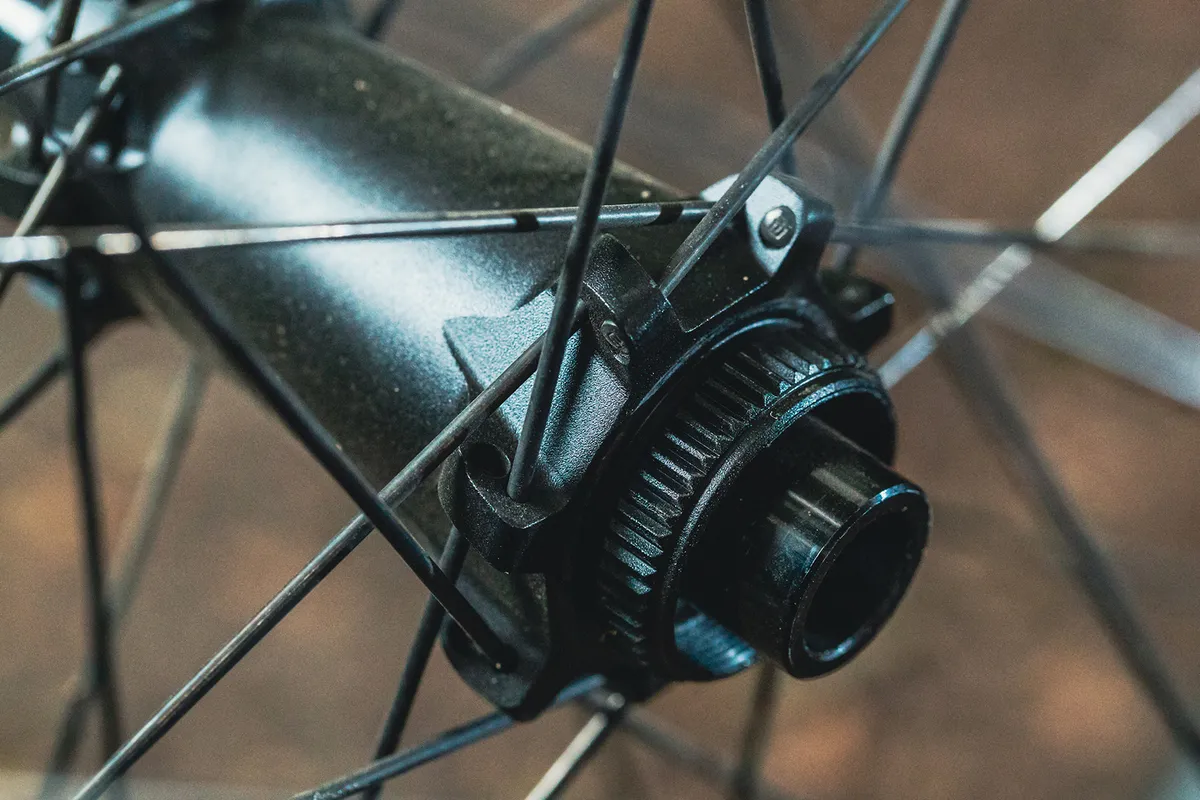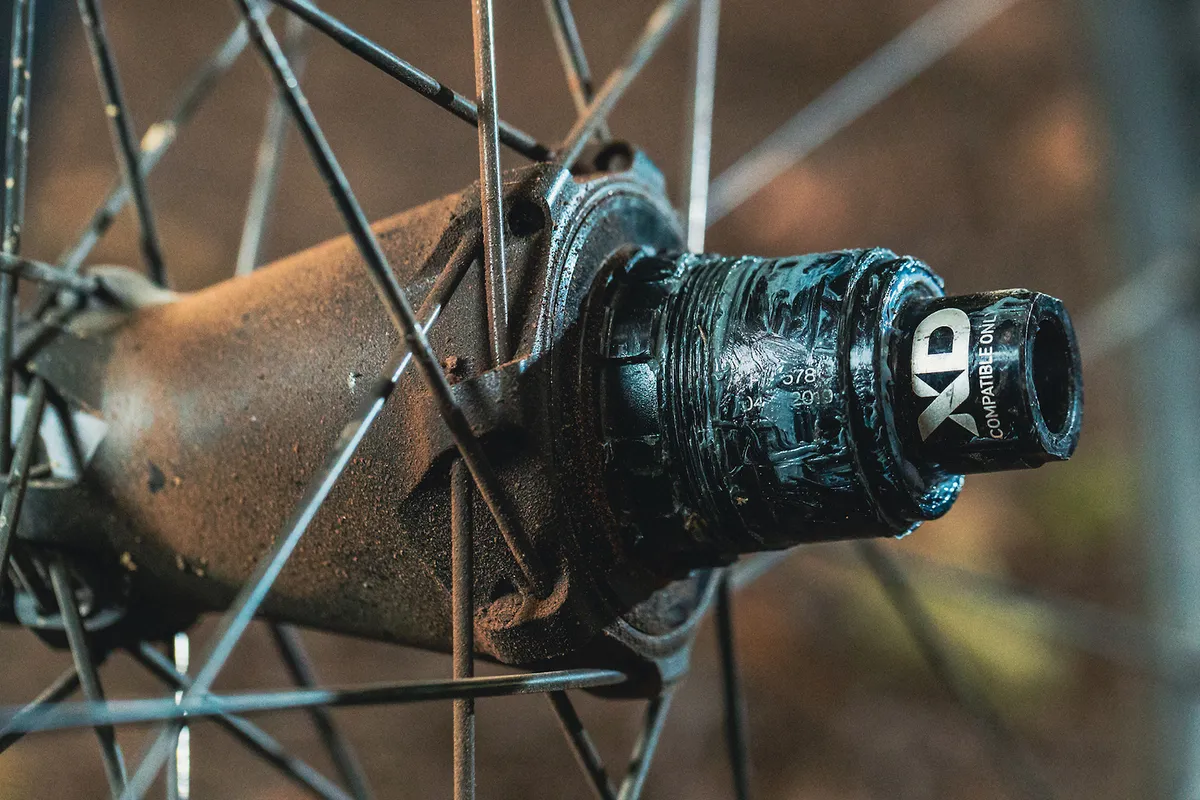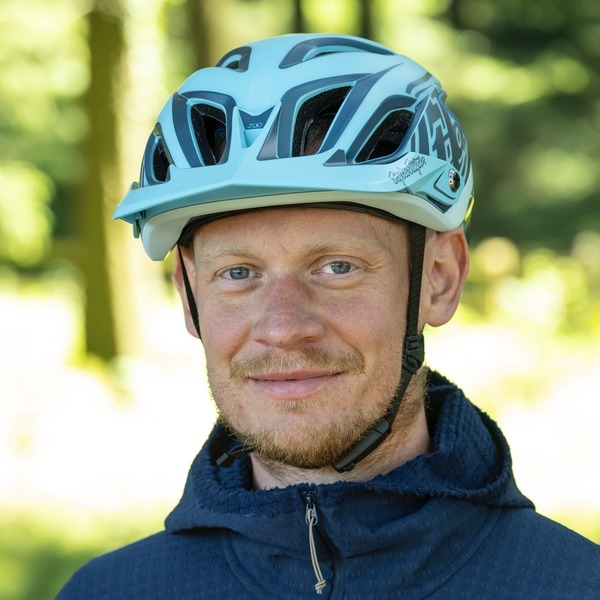On paper, the Syncros Revelstoke 1.0 is an impressive carbon wheelset. At 1,851g they’re the lightest in our 2021 wheels test, and feature a low freehub engagement angle and a wide internal width.
If a carbon wheelset is in your sights, then their £1,299 price point will also appeal because they’re also the cheapest carbon wheels I had on test.
One thing many testers noted was how deep the rims are. This gives them an aggressive stance when clamped between the dropouts and mounted with chunky rubber.
Riders familiar with deep carbon road wheels will naturally assume that this depth will lead to a harsh feel – but this should be countered by the Revelstokes’ relatively low spoke count of 28 per wheel.
Syncros Revelstoke 1.0 specifications and details
The bold carbon rim has an internal width just shy of 31mm, so there’s plenty of support for tyres in the 2.5 to 2.6in range.
The rim has a hookless design so the inside edge of the wall is straight vertically, as opposed to having a hook under which the tyre bead engages.
In practice, this makes little difference to getting tyres on and off, in our experience, and poses no issues with tyre security. It likely contributes to a slightly lower production cost, which is no bad thing.
It is also said to help with the tyre’s profile because the internal hook on hooked rims can pinch the sidewall of a tyre inwards.

The rims are deep, measuring 36mm from top to bottom. They’re also wider than many at their exterior, with the widest section being a little further down from the top of the rim wall.
Combined with a reasonably tall outer overall diameter and only a moderately shallow rim wall, getting the tyres onto these wheels is tight.
With the rim getting wider a touch below the top of the rim wall, I also found it harder to hook my tyre levers over the wall to pull the tyres on, at least until the tyres became well stretched with continual fitting and removal.
The rims are pre-taped, and while not the tidiest, the taping is reasonable.
The supplied valves are long – handy given the rim’s depth – but if you end up replacing the valves, or fit tubes, you may want to check valve lengths ahead of time.
I had mixed results inflating tyres on these wheels. At times they popped up instantly, but at others I found the tyres struggled to sit neatly around the valve’s rubber head, resulting in air loss, and I needed plenty of tyre sealant to get the wheels to remain inflated when I first used them.
Once that was sorted, they posed no further issues.

When the tyres do pop up, they do so with a very satisfying and fairly loud bang, but quite high tyre pressures were required to get to this stage.
With different diameter flanges, the straight-pull spoke lengths vary a little. The spokes are butted to help keep weight low.
Large hub shells continue these wheels’ deceptively bulky look. Axles are chamfered to help get the end caps on and off, and there’s plenty of grease present behind them.
The hubs come ready for Center Lock rotors and wheelsets ship with an XD freehub, though Shimano HG and Micro Spline freehubs are also available.
Syncros Revelstoke 1.0 performance
With a very quick freehub pickup, the Revelstokes are reactive on the trail, transferring pedal power to forward motion with little to no delay.
There’s a mid-volume buzz to the wheels, a little lower pitched than the Industry 9 Hydras as found on Reserve's 30 I9 Hydra wheels, but less in your face than the Hope's Fortus 30 wheels.
I was expecting to be battered around by the deep carbon rims, but with plenty of width and a fairly low spoke count, I wasn't. In fact, the Revelstokes are well-mannered on the trail.

They’re not quite as smooth-running as Zipp's 3ZERO MOTOs, but have a similar firm yet muted feel to the Reserve wheels.
If I hyper-analysed my rides, I'd say the rear wheel was a touch more prone to skipping around on fast, rocky trails, but a small change in tyre pressures could easily cancel that out.
Syncros Revelstoke 1.0 bottom line
The Revelstokes were on the more challenging end of the scale when it came to getting tyres on and off, and getting them seated. However, once set up and running, they proved reliable performers.
They’re not the most compliant wheels, but I didn’t struggle with their ride feel, despite the deep rim depth.
Their lightweight will appeal to some, as will the carbon construction and fast freehub. Their reasonable price will put them in reach of more riders, too.
How we tested
Wheels are a pretty pricey upgrade, so we put 12 trail/enduro sets to the test to find out if there’s an inherent benefit to pricey carbon fibre hoops or is alloy better for hard-hitting rims?
The wheelsets were taken on back-to-back runs down selected tracks in the Welsh woods and at BikePark Wales. They were pummelled over and into rocks and drops, turns and berms, and off-camber roots.
To keep things fair, all our testing was done on the same bikes, both hardtail and full-sus, with the same tyres (thanks Specialized!) at the same pressures.
We tested 29in wheels, but most are offered in 650b versions too. While we predominantly ran 2.6in rubber, we also slung some 2.3in tyres on, and we varied the pressures between test sessions to see what difference we could feel.
Bikes shouldn’t be a pain to live with, so we took into account the ease with which tyres could be fitted and inflated. Likewise, we considered how easy it was to access bearings and swap freehubs, too.
Also on test
Product
| Brand | syncros |
| Price | 1299.00 GBP,1399.00 USD |
| Weight | 1851.0000, GRAM (29in) - per wheelset |
Features
| br_rimMaterial | carbon |
| br_wheelSize | 29in_700c |
| br_brakeTypeSimple | disc |
| br_hubs | Syncros Straightpull, Centerlock |
| br_spokes | DT Swiss Competition |
| br_rimInternalWidth | 30.9mm |
| Features | Weight (f): 850g Weight (r): 1,001g Engagement angle: 4.6 degrees |
| br_spokeCountRear | 28 |
| br_spokeCountFront | 28 |
